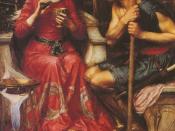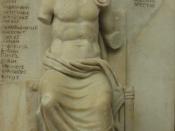While examining a work, questions should arise from the audience about the characters and the motive of the author when creating the characters. When reading Medea, the audience is forced to not only examine the author but the ideas that authors had about society and mankind at that time. The play Medea creates many questions about what characteristics of a person are more important than others and how one should view the value of emotions that Euripides creates. Drama should evoke emotions that one exhibits and observes throughout their lives. The Greek authors felt that life should imitate art and more importantly, that art should imitate life. In order for a play to have a sincere impact on the audience it must look, feel and taste as though it is truly life. The work Medea is the best example of this in a play. There are no perfect characters but instead there are real characters like Jason and Medea that deal with real emotions like love, lust, hatred, contempt and most importantly, revenge.
For many readers, it can be difficult to understand the motives of Euripides when examining the characters of this play. The protagonist and antagonist roles in the play switch back and forth between both Medea and Jason eventually landing on Medea, the most unlikely hero of them all. Euripides does this on purpose to provoke thought from the audience. By creating an imperfect play, Euripides creates the perfect imitation of life itself.
Euripides makes it extremely difficult for the audience to understand the characters that he creates because, like real people, they have many different layers to their character. Jason should be the hero of the play when one examines the superficial qualities that he has. The audience is lead through the depths of Jason's character by Euripides to show his darker, more unemotional side. He is first perceived as war hero that retrieved the Golden Fleece and married King Creon's daughter. The audience then learns through dialogue with Jason and Medea that Jason values logic more than he does true emotions. He sacrifices his children and the relationship that he has with Medea for a marriage that will allow him to become more successful. The audience soon realizes that with characteristics like those, Jason cannot be the hero. In contrast, Medea can first be perceived as the anti-hero. When seeing her children Medea cries to them "What should be wept for bitterly. I hate you,/ Children of a hateful mother. I curse you/ And you father. Let the whole house crash."# Confusingly enough, by the end of the play the audience is secretly applauding for Medea despite all that she has done or because of what she has done. Medea commits the most unnatural act for a mother by killing her children but does it so that she can commit the most natural act of a person and that is to defend herself . She truly believes in the love that she and Jason had and refuses to be rejected by her true love. Because of this, she sacrifices the lives of her children. "â¦to suffer my children/ To be slain by another hand less kindly to them./ Force every way will have it they must die, and since/ This must be so, hen I, their mother, shall kill them."# Within this aspect of the play, the author again plays with the emotions of the audience in order to portray real life. With thoughts of homicide flourishing in the mind of Medea, the audience is forced to examine themselves and decide whether an act like that can be considered justifiable. The audience must feel as though it is justifiable in the case of Medea because of her hero role. Not only must there be a good reason for this act, but the act of killing her children must be viewed by the audience as honorable. While this thought may only be contemplated by the audience for mere seconds, it accomplishes the purpose of this work. Euripides forces the audience to feel the real emotions that Medea has and discover the those feelings and actions are a part of the human condition of feelings. While Medea takes her hate and contempt of Jason to an unbelievable level of evil, she is in fact expresses the most simplistic and human emotions that we feel each day. " No, it was not to be that you should scorn my love/ And pleasantly live you life through, laughing at meâ¦"# Medea should not be looked at by the audience as a murdering wife but instead as a woman that sacrificed all that she had, including her children, to help Jason understand the hurt and sadness that he inflicted upon her.
This play is difficult to read, not because of the use of language, but because of the raw emotions that Euripides creates in his characters. It was said that Greek authors created drama so that one could come to a play and feel the emotions that they went through in their life. There was this hope that by seeing others act out emotions like anger and sadness on the stage, the audience members would be able to examine their own feelings in a more knowledgeable way. At first, it seemed very confusing to understand the motives of Euripides. The question of why he would exercise so many emotions in one work is one that the audience ponders throughout the play. By the end of the work the exercise becomes self evident. In all of us, Medea exists. While her emotions are extremely extravagant at times, she embodies human feelings. It is for that reason that she is considered the hero of this work. Throughout the work, Medea is honest with the audience about her emotions toward all that she encounters, while Jason lies and manipulates those around himself to get ahead in the world. Even though Jason displays what appears to be hubris, his tragic flaw is not that. It is instead his lack of emotion and his lack of a human characteristics that Euripides displays that makes him the protagonist of this work.





